
Guangzhou Shipyard International (GSI) is reinforcing its position as a leader in building alternative fuelled ships as it begins sea trials of the Stena Pro Patria, the first methanol powered dual-fuel tanker constructed in China.
GSI signed the deal to build three 49,990 dual-fuel DWT tankers with Proman Stena Bulk, a joint venture between Sweden based Stena Bulk AB and Switzerland headquartered Proman in 2019, the other two ships presently under construction being Stena Pro Marine and Stena Prosperous which are due to complete this year.
GSI further confirms it is extending the deal to build three additional ships to the same design.
GSI vice president William Zhou hailed the start of sea trials and testing of the propulsion equipment as ‘a watershed moment’ in the development of methanol as an alternative fuel for MR tankers. He said each tanker will significantly slash NOx emissions by using around 12,500 tons of methanol as marine fuel a year powered by an MAN dual-fuel 6G50ME C9.6 engine, without catalyst conversion.
“We are very proud to see the first ship in this ground-breaking fleet begin sea trials,” he said. “We won the contract under stiff competition from Korea and this ship shows what GSI is truly capable of building on our experience of building 30 dual fuel vessels (see notes to editors). The construction of the Stena Pro Patria is a massive achievement for all parties involved and I would like to thank Proman, Stena, our team, MAN engines as well as the class society DNV for all they are doing to make this bold ship design and fleet a reality. GSI is absolutely committed to leading innovation in alternative fuelled ships and these ships can go a long way in showing how methanol can be deployed safely and at relatively low cost.”
Mr Zhou said each tanker uses the latest energy efficiency technology including continually controlled combustion, optimised tuning, redesigned and aerodynamic hull lines and an energy shaft generator reducing fuel consumption.
Mr Zhou added he sees a big future for methanol as it is no more dangerous than diesel and is less hazardous to the environment than diesel or HFO biodegrading rapidly in the event of a spill.
“Methanol has the benefit of being widely available already near many ports worldwide having being shipped for decades,” he said. “Moreover, bunkering of methanol, as an ambient temperature liquid fuel, is similar to distillate fuel so can be used in existing bunkering facilities with relatively few upgrades. Methanol as a result is logistically cheaper to move around ports today than other low temperature cryogenic alternative fuels like ammonia, bio methane and hydrogen, though those fuels will have their place in the future and GSI is working on developing these technologies having secured AIP from class societies. But methanol provides a solution now and we want to share this breakthrough and help more owners and operators on the journey to meeting the IMO 2050 GHG targets.”
Mr Zhou said the eco friendly Stena Pro Patria and her sister ships further underline GSI’s drive to be one of the world’s greenest shipyards.
“Decarbonising maritime is the challenge of our generation and GSI is doing all it can to develop the latest thinking and technology,” he said. “GSI has a clear sustainability strategy with the twin aim of building greener ships and being a greener shipyard. We are delivering this by pioneering a range of dual fuel technologies and we have delivered a large number of vessels equipped with Exhaust Gas Cleaning Systems. On the shipyard front we are making changes to how we operate which saw us awarded Green Shipyard status by Guangzhou Local Government in 2021. This followed an evaluation of emissions and waste treatment after we invested heavily in new infrastructure such as better sewage and rust treatment systems as well as vapour organic collection and industrial garbage treatment systems and bucket recycling of coating material. We also hit the Zero Waste Factory Standard after cutting 2,000 tonnes of the industrial waste in 2020. We further invested in new control systems for steel cutting and paint air-pollution which enabled us to meet the Shipbuilding Air Emission Control Standard.”
Notes to editors
1. GSI has built, or is building, a total of 32 dual fuel ships including two LNG propulsion ropax vessels, two LNG propulsion Suez tankers, 14 LNG propulsion LR2 tankers, eight LNG propulsion PCTCs and six methanol propulsion MR tankers. More projects are under discussion.
GSI BACKGROUND
· Guangzhou Shipyard International Company Limited (GSI) has a long history dating from 1914 and is the largest shipbuilder in South China.
· GSI is a state-owned company under China State Shipbuilding Corporation Limited (CSSC).
· The company is located in Longxue Island, Nansha District, Guangzhou City, about 70 kilometres Guangzhou, near to Hong Kong and Macau.
· The company covers an area of three million square meters, with two large docks, four berths and four 600-ton gantry cranes.
· GSI specialises in building the full range of crude oil, product oil, chemical tankers, VLOC, large container ships, high-tech ships, such as LNG, semi-submersible ships, ropax vessels and polar ice class vessels.
· The shipyard has the capacity to design, construct and repair vessels up to 400,000 DWT while annual shipbuilding output can reach up to 3.5 million DWT.
The opinions expressed herein are the author's and not necessarily those of The Xinde Marine News.
Please Contact Us at:
media@xindemarine.com


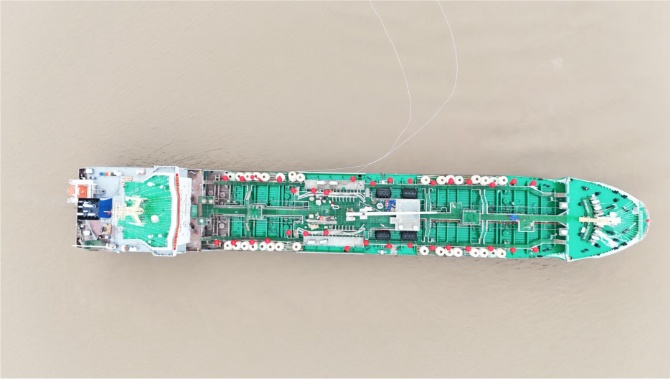 China Launches First Nationwide Methanol Bunkering
China Launches First Nationwide Methanol Bunkering 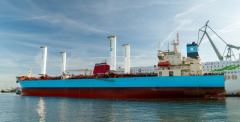 bound4blue completes first eSAIL® installation und
bound4blue completes first eSAIL® installation und  Deck-Capacity Pricing: Why the Forward-Superstructu
Deck-Capacity Pricing: Why the Forward-Superstructu 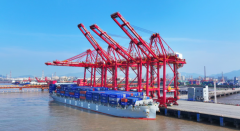 Ningbo Ocean Shipping Announces Order for Four 4,30
Ningbo Ocean Shipping Announces Order for Four 4,30 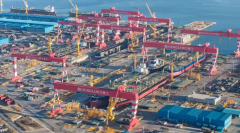 The "Norwegian King of Shipping" Orders Two VLC
The "Norwegian King of Shipping" Orders Two VLC 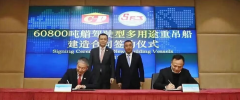 The opportunity has arrived. COSCO SHIPPING Special
The opportunity has arrived. COSCO SHIPPING Special